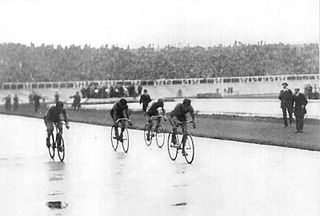
The 1900 Summer Olympics were held as part of the 1900 World's Fair, during which many cycling events were contested. The IOC website currently affirms a total of 3 medal events, after accepting, as it appears, the recommendation of Olympic historian Bill Mallon regarding events that should be considered "Olympic". These additional events include the men's points race. Thus, three cycling events are considered Olympic events. These three competitions were held between 9 September and 16 September 1900. The cycling part of the World's Fair included 250 competitors, 160 of them French. In the sprint and 25 km events, 72 competitors, all men, from seven nations competed.

Cycling has been contested at every Summer Olympic Games since the birth of the modern Olympic movement at the 1896 Summer Olympics, at which a road race and five track events were held. Mountain bike racing entered the Olympic programme at the Atlanta Olympics, followed by BMX racing in 2008 and freestyle BMX in 2020. Prior to the 2020 Summer Olympics, all events were speed races, but the 2020 programme will feature BMX freestyle for the first time.

The men's 10 kilometres was one of the five track cycling races on the Cycling at the 1896 Summer Olympics programme. It was held on 11 April and comprised 30 laps of the track. The 1896 Games was the only time that the 10 kilometres track race was part of the cycling program at an Olympic Games. Six cyclists from four nations competed. The event was won by Paul Masson of France, the second of his three victories that day. His countryman Léon Flameng finished second, while Austrian Adolf Schmal was third.

The men's 100 kilometres was one of five track cycling events on the Cycling at the 1896 Summer Olympics programme. It was the first race held, on 8 April. It required cyclists to complete 300 circuits of the track. Nine cyclists from five nations competed. The event was won by Léon Flameng of France, with Georgios Kolettis of Greece coming in second.

The men's 25 kilometres was one of three cycling events, all track cycling, on the Cycling at the 1900 Summer Olympics programme that were open to all amateurs, had more than one nation participating and no handicapping. It was held on 15 September. Ten cyclists competed. Four had already competed in the sprint event. The result of the race proved Louis Bastien of France to be the top long-distance cyclist present, while Louis Hildebrand finished in second and Auguste Daumain in third. One of the contestants, Louis Trousselier, would go on to win the 1905 Tour de France. Prizes were awarded to the top four finishers: art objects valued at 400 francs, 300 francs, 200 francs (third), and 100 francs (fourth).

The men's 100 kilometres was one of seven track cycling events on the Cycling at the 1908 Summer Olympics programme. Its distance was the longest of the individual event distances. A challenge cup was presented by the Prince of Wales to the winner. There were 43 competitors from 11 nations. Each nation could enter up to 12 cyclists. The event was won by Charles Henry Bartlett of Great Britain, with his countryman Charles Denny finishing second. Octave Lapize earned bronze, making France the only nation to have medalists at both appearances of the 100 kilometres race.

The Netherlands competed at the 1920 Summer Olympics in Antwerp, Belgium. 130 competitors, 129 men and 1 woman, took part in 58 events in 15 sports.

Athletes from the Netherlands competed at the 1924 Summer Olympics in Paris, France. 177 competitors, 168 men and 9 women, took part in 81 events in 17 sports.

The Netherlands competed at the 1936 Summer Olympics in Berlin, Germany. 165 competitors, 145 men and 20 women, took part in 75 events in 15 sports.

Jacobus "Ko" Matheus Willems was a track cyclist from the Netherlands, who represented his native country at the 1924 Summer Olympics in Paris, France. There he won the gold medal in the 50 km track race.

The men's points race was an event at the 1992 Summer Olympics in Barcelona, Spain. There were 38 competitors from 38 nations, with 24 cyclists competing in the final. Each nation was limited to 1 cyclist in the event. The event was won by Giovanni Lombardi of Italy, the nation's first victory in the event since 1900 and second victory overall; Italy was the first nation to have two wins in the men's points race. Léon van Bon gave the Netherlands its second consecutive silver in the event. Bronze went to Cédric Mathy of Belgium.

The men's points race was an event at the 1996 Summer Olympics in Atlanta, Georgia. There were 28 participants from 28 nations, with 24 cyclists completing the final, which was held on July 28, 1996. Each nation was limited to one cyclist in the event. The event was won by Silvio Martinello of Italy, the nation's second consecutive and third overall victory in the men's points race. Silver went to Brian Walton of Canada and bronze to Stuart O'Grady of Australia; it was the first medal in the event for both nations.

The men's sprint at the 1952 Summer Olympics in Helsinki, Finland was held from July 28 to July 31, 1952. There were 27 participants from 27 nations, with each nation limited to a single cyclist. The event was won by Enzo Sacchi of Italy, the nation's second consecutive victory in the men's sprint. Lionel Cox's silver was Australia's first medal in the event. Werner Potzernheim of Germany took bronze.

The men's sprint event was part of the track cycling programme at the 1924 Summer Olympics. The field consisted of 31 cyclists from 17 countries. The Vélodrome de Vincennes track was a 500-metre (1,640 ft) loop. The event was won by Lucien Michard of France, the nation's third victory in the men's sprint. His teammate Jean Cugnot earned bronze. Jacob Meijer of the Netherlands took silver, putting the Dutch team on the podium for the second consecutive Games.
The men's tandem event was part of the track cycling programme at the 1924 Summer Olympics.

The men's sprint cycling event at the 1932 Summer Olympics took place on August 1 and 3. The format was a sprint of 1000 metres. There were nine competitors from nine nations, with each nation limited to one cyclist. The event was won by Jacobus van Egmond of the Netherlands, the nation's second victory in the men's sprint. It was the fourth consecutive Games that the Netherlands reached the podium in the event. France made the podium for the third consecutive Games, with Louis Chaillot taking silver. Bruno Pellizzari gave Italy its first men's sprint medal with his bronze.

Cycling, also called bicycling or biking, is the activity of using / riding bicycles, human-powered, wheeled vehicles, ,
for purposes including transport, recreation, social interaction, exercise, sport, therapy, other purposes, or any combination thereof.

The men's sprint at the 1928 Summer Olympics took place at the Olympic Stadium in Amsterdam. There were 18 competitors from 18 nations, with each nation limited to one cyclist. The event was won by Roger Beaufrand of France, the nation's second consecutive and fourth overall victory in the men's sprint. Antoine Mazairac of the Netherlands, the only other nation to have won a gold medal in the event, put the Dutch team on the podium for the third consecutive Games with his silver. Willy Hansen earned Denmark's first medal in the event, with his bronze.

The men's sprint cycling event at the 1936 Summer Olympics took place on 6 and 7 August and was one of six events at the 1936 Olympics. There were 20 competitors from 20 nations, with each nation limited to one cyclist. The event was won, in a disputed final, by Toni Merkens of Germany, the nation's first medal in the men's sprint. Arie van Vliet took the silver medal, the fifth consecutive Games that a Dutch cyclist had finished in the top two. Louis Chaillot of France became the first man to win multiple medals in the event, adding a bronze to his 1932 silver; it was the fourth consecutive podium appearance for France.

The men's sprint cycling event at the 1948 Summer Olympics took place between 7 and 9 August and was one of six events at the 1948 Olympics. There were 23 cyclists from 23 nations, with each nation limited to one competitor. The event was won by Mario Ghella of Italy, the nation's first victory in the men's sprint. Reg Harris of Great Britain, heavily favored coming into the event, finished with silver, the first medal for a British cyclist in the sprint since 1920. Axel Schandorff's bronze was Denmark's first medal in the event since 1928. The podium streaks of the Netherlands and France both ended, with neither nation's cyclist able to advance to the quarterfinals.

















